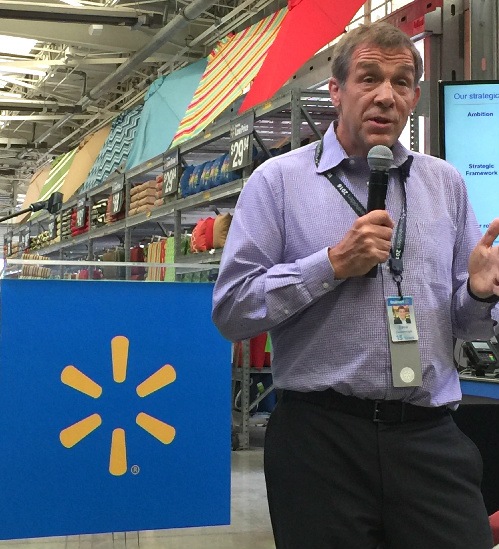Walmart’s David Cheesewright shares international game plan
by June 22, 2016 11:30 am 767 views

David Cheesewright, CEO of Walmart International.
Walmart International is a complex and diverse business comprising roughly one-third of Wal-Mart’s total sales revenue annually. Walmart International CEO David Cheesewright describes the global portfolio as a “baby brother” to the larger U.S. retail business.
He said the retail giant’s focus of the past two years has been to turnaround its flagship U.S. business and much of the work needed globally has taken a backseat.
“The company focus has been to get the U.S. business back on track and invest in e-commerce, so for Walmart International our role has been to balance growth and profit. The strategy for this year is much the same. Our ambition is to be the world’s largest digitally enabled food retailer,” Cheesewright said during a recent media briefing in Northwest Arkansas.
MISSION AND FOCUS
This year, Cheesewright expects Walmart International will have sales of roughly $134 billion, compromised a bit from foreign exchange rates against the strong U.S. dollar. He said the complexity of the international business is a bonus for Walmart U.S. because of the innovation and best practices around the world that can be shared domestically as well as a deep bench of bright talent with a diverse background in retail and ancillary businesses.
Cheesewright said food is a major focus for the international division going forward because there are more synergies and ability to scale the food business. He said the company is moving away from general merchandise fairly radically in places like Japan, where they will become more like a pure grocery store that also sells consumables.
“There are advantages to be a first mover as a digital food retailer for us and so you will see food as a major focus for Walmart around the world,” he said. “That doesn’t mean we don’t like general merchandise. In places like Canada, the stores are pretty much like those in the U.S. offering apparel and many other non-food items. We will continue to support general merchandise in markets where it fits, but food will also be a focus,” Cheesewright said.
He explained that a major reason why Walmart operates abroad is to take advantage of the growth opportunities. In the 28 countries where Walmart operates, Cheesewright said the retailer has access to about 60% of all the global growth that will occur in the next 10 years. He said a lion’s share of growth (80%) is global.
“It’s very simple logic that if International can’t grow over the U.S. that makes it very hard for our total corporation to grow against global competitors. As a business whose goal is to sell for less, if you are not growing, life is pretty tough,” he said. “We are very proud that for 9 quarters now Walmart International has seen increased comp sales growth.”
Aside from growing sales, Cheesewright said International’s role is also to be accretive on talent. The world is getting more complex, but people who have grown up in the international businesses have tended to move across countries more, they tend to have a bigger roles against smaller businesses and are much more adept at dealing with complexity.
“We see it as a positive part of our business to supply the U.S. and Sam’s Club with experienced talent such as John Furner at Sam’s Club, Judith McKenna at Walmart U.S. and many others. We also see International as a training ground for U.S. talent who can work abroad for a while and then go back to the U.S. with diverse experiences,” he said.

PORTFOLIO MANAGEMENT
Cheesewright said Walmart International has been trying to simplify the diverse portfolio of businesses it operates during the past two years. The company has divested away some of the non-core businesses such as a shopping center chain in Chile, a restaurant chain and bank in Mexico, and a real estate joint venture in Canada. Walmart is in the first round of bids to dispose of its apparel business in Mexico. He said you can expect to see this type of disposal continue as the company streamlines its portfolio.
“Any business that is either not performing or we don’t see a way of turning it around and we don’t believe it’s core to our operations we will look for ways to dispose of it,” Cheesewright said.
He said the other area of focus is positioning the business in countries where there is the biggest opportunity for growth. As Walmart has grown up, he said the retailer is larger in the slower growing countries like Canada and the U.K. and smaller in countries like China where growth is larger.
Going forward, Cheesewright said capital expenditures will be focused on areas where there are the best growth prospects, such as Mexico and where profits are lagging such as China. He said for the past two years the strategy has been to focus on three main countries.
Re-energizing Mexico has been a top priority because it is biggest and most profitable “when it works,” Cheesewright said.
Next, the plan was to create a sustainable platform for growth in China, which is underway now. He said Walmart has built out talent, simplified the supply chain, and improved buying practices with a centralized operation. He said the retailer is working with mall developers for better real estate sites for Sam’s Club, which will be a big part of the investment in China going forward.
Cheesewright said the Asda business in the United Kingdom has been disappointing in the recent quarter in what is a very difficult climate. Walmart has since changed leadership in the Asda business and will continue to focus heavily on turning around this large grocery business that has lost market share to Aldi and Lidl over the past year.
Walmart said its business in Mexico is quite profitable delivering 9% comp sales in the first quarter. The solid performance was attributed to higher wages with an overall better macro economic climate. The company also said it is doing a better job connecting with its customers in all the formats it operates.
In Latin America, Walmart said there is some good momentum and it plans to double the business of Walmex, which includes Mexico and Central America over the next five years. That growth will come from expanding the bodega grocery formats and adding a few supercenters and larger grocery formats in places like Nicaragua and Guatemala with a large amount of the expansion taking place in Mexico.
Cheesewright told the media there is no room in the portfolio for another country, but there are growth opportunities in expanding in some of the markets where Walmart already has a presence — namely Mexico and China where the majority of capital investments for new stores will be deployed over the next years.
BY THE NUMBERS
27: Countries where Walmart International operates
$134 billion: Expected sales revenue this year
6,300: The number of stores abroad
60: The number of different businesses Walmart International operates
800,000: Walmart International’s workforce
120 million: The number of international customers each week
